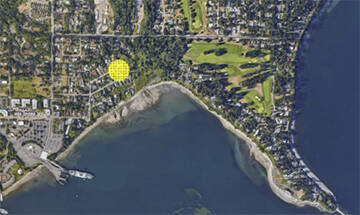Why let wastewater go to waste when with treatment it can be used for irrigation – or even drinking?
That is one issue the Bainbridge Island City Council is trying to decide.
Benefits of reusing water are many, including reducing pollutants in Puget Sound waters. Depending on the level of water treatment it can be used for: irrigating areas off-limits to people; irrigating in populated areas such as golf courses; recharging aquifers; providing grey water for toilet flushing; and recharging streams.
Of course the higher the treatment, the higher the cost.
City Public Works director Chris Wierzbicki told the council Nov. 15 about three options. None included the most-expensive option of turning effluent into drinking water.
Option 1 would just clean the effluent more that goes into Puget Sound. That would cost $2.5 million. Option 2 would clean it to that same level, with some of it being used for irrigation and recharging groundwater. That would cost up to $15 million and bring a medium return on investment. Option 3 would include a new Package Treatment Plant that would do all of those things plus relieve water and sewer pressures and costs. That would cost the most at up to $16 million, but also bring the highest return on investment, Wierzbicki said.
City staff recommends continuing to study Options 2 and 3.
Already planned for the BI Wastewater Treatment Plant are ongoing and near-capacity upgrades from 2022-28 that will cost $3.6 million and long-term capacity upgrades from 2028-35 that will cost $3.4 million.
Deputy mayor Clarence Moriwaki said, “It would be wonderful if we could have Class A” for drinking water, adding he’s seen such a system, and it’s “quite amazing” but costly.
City manager Blair King said cleaning effluent is an asset. He said some private companies are actually buying it and selling it after treatment.
Councilmembers Leslie Schneider and Michael Pollock said they prefer Option 3, but Kirsten Hytopoulos said she thinks both 2 and 3 should be studied more. If that can’t happen she suggests pushing pause.
“We need a groundwater plan” and other work to be done before deciding this, she said. “At some point we will need to add capacity and add another plant.”
She and Jon Quitslund said tax money could be used to help pay for improvements because such work benefits the entire island. Hytopoulos said it would make Puget Sound cleaner, and Quitslund said adding capacity where growth is concentrated in Winslow benefits everyone.
King said he envisions user fees will pay for it.
Pollock suggested some of the effluent should be cleaned to recharge streams to help salmon.
Wierzbicki pointed out there is limited space at the plant to grow because of surrounding residents and wetlands. Another plant would be about the same size, requiring about a half-acre.
He added that cleaner effluent could be distributed to places like Wing Point Golf Club and the Bainbridge High School athletic fields. He said there is so much effluent that not all could be used for irrigation but it would mean it would be cleaner going into the Sound. He said cleaning effluent would benefit the entire city because it would draw less from wells.



